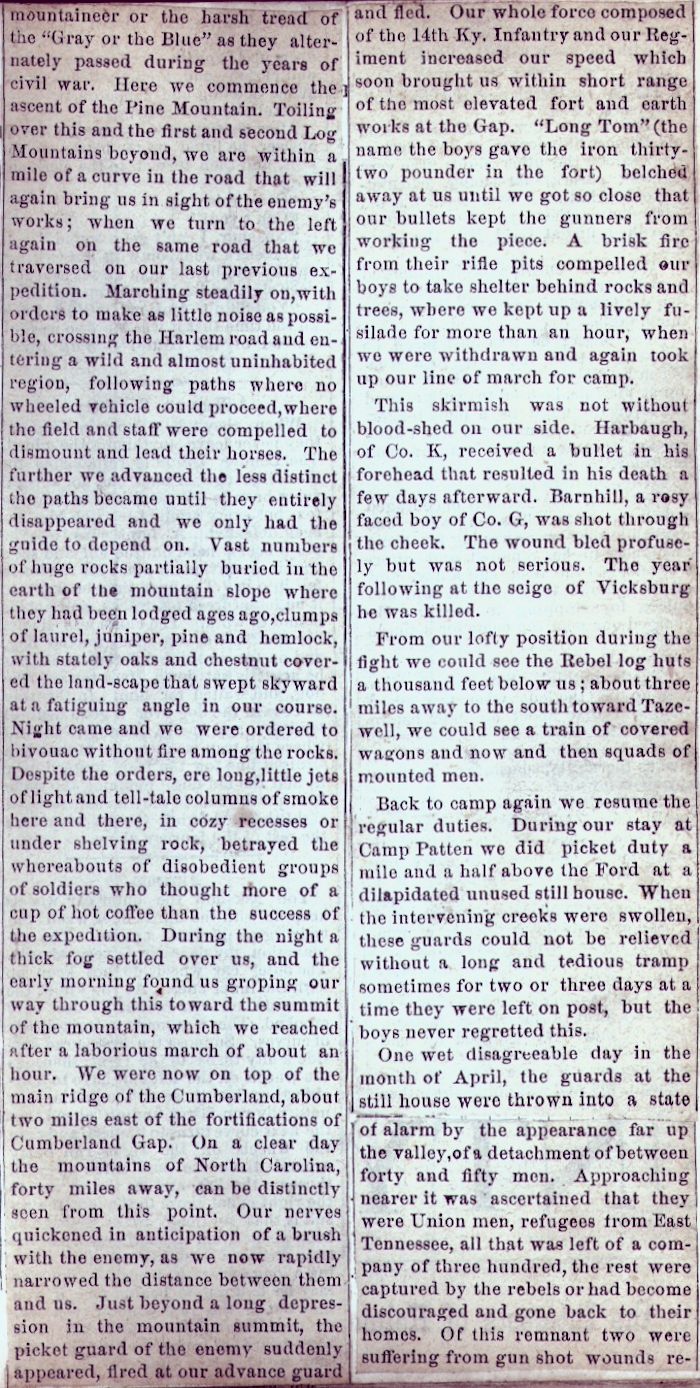| Camp & Field Page 16 | Camp & Field Index Page | 16th OVI Home Page | Camp & Field Page 18 |
The Camp & FieldArticles by Theodore Wolbach |
 Cpl. Theodore D. Wolbach |
The following image is taken from a book titled "Mortality and Statistics of the Census of 1850" in which it is believed retired Captain Rezin H. Vorhes, Company H, pasted over the pages a series of articles written by Cpl. Theodore D. Wolbach, Company E, titled "Camp and Field" and published, by chapter, in the Holmes County (Ohio) Republican newspaper from February 24, 1881 to August 17, 1882. The articles tell the story, in great detail and color, of the 16th OVI, from the inception of the 3-year regiment in October, 1861, through all its camps, battles and marches until it was disbanded on October 31, 1864. The articles pasted in the Vorhes book cover the first 35 chapters, published through October 20, 1881. All the remaining chapters were recently found in a Holmes County library by researcher Rob Garber who obtained copies, performed the transcriptions and provided to this website and which are also presented here, thus providing the complete work by Theodore Wolbach.
Throughout these articles click on the underlined white text for additional details.
The webauthor thanks 16th Ohio descendant Rob Garber for his excellent research on the Camp And Field articles and for performing the tedious digital transcription of those articles found on each page. The transcriptions were made to reflect the original articles verbatim, misspellings and all. Rob is the 3rd great nephew of Capt. William Buchanan, Company F, 16th Ohio, who served in the 90-day regiment as a private, re-enlisting in the three year regiment, and eventually making the rank of Captain of Company F. Thanks Rob!
Page 17 - Chapter 10 - April, 1862
 |
mountaineer or the harsh tread of the |
and fled. Our whole force composed of the 14th Ky. Infantry and our Regiment increased our speed which soon brought us within short range of the most elevated fort and earth works at the Gap. This skirmish was not without blood-shed on our side. Harbaugh, of Co. K, received a bullet in his forehead that resulted in his death a few days afterward. Barnhill, a rosy faced boy of Co. G, was shot through the cheek. The wound bled profusely but was not serious. The year following at the seige [sic] of Vicksburg he was killed. From our lofty position during the fight we could see the Rebel log huts a thousand feet below us; about three miles away to the south toward Tazewell, we could see a train of covered wagons and now and then squads of mounted men. Back to camp again we resume our regular duties. During our stay at Camp Patten we did picket duty a mile and a half above the Ford at a dilapidated unused still house. When the intervening creeks were swollen, these guards could not be relieved without a long and tedious tramp sometimes for two or three days at a time they were left on post, but the boys never regretted this. One wet disagreeable day in the month of April, the guards at the still house were thrown into a state of alarm by the appearance far up the valley, of a detachment of between forty and fifty men. Approaching nearer it was ascertained that they were Union men, refugees from East Tennessee, all that was left of a company of three hundred, the rest were captured by the rebels or had become discouraged and had gone back to their homes. Of this remnant two were suffering from gun shot wounds re- |
| Camp & Field Page 16 | Camp & Field Index Page | 16th OVI Home Page | Camp & Field Page 18 |